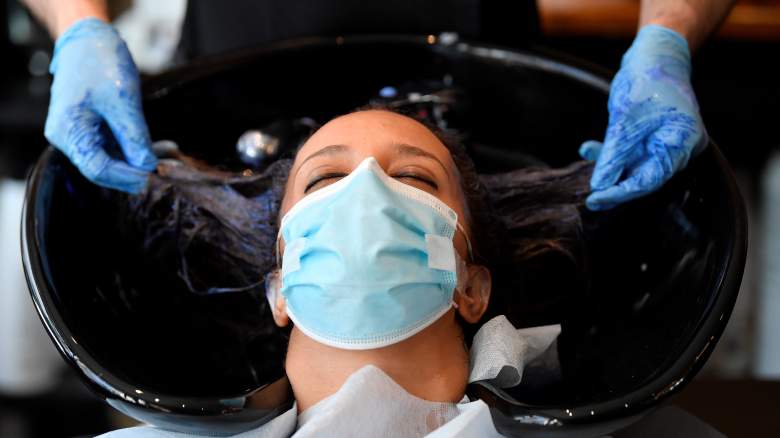
Fever, a dry cough, fatigue and shortness of breath are listed as some of the most common coronavirus symptoms, with many other possible symptoms listed on the CDC website. However, some COVID-19 patients have reported experiencing one potential symptom that isn’t commonly mentioned: hair loss.
Recently, actress Alyssa Milano opened up about contracting the virus and the hair loss she experienced in a video that went viral and has been viewed on Instagram over 1 million times:
Milano said she contracted the virus in April and is still experiencing symptoms and recently went to the hospital because she was feeling “heaviness” in her chest. In the above video, posted on August 9, Milano began brushing her hair and showed the camera that after every few brushes, a clump of hair would come out.
Milano’s experience, and other similar stories, has led people to wonder if hair loss is a symptom or side effect of the coronavirus? What have experts said about this?
A Recent Study Found That Hair Loss May Be More Common in ‘Long Haul’ COVID-19 Patients Than Previously Thought
One recent study is shedding light on many unexpected symptoms, including hair loss, experienced by long-term COVID-19 patients, or “long haulers.” The Indiana University School of Medicine study conducted by Dr. Natalie Lambert and Survivor Corps recently explored the experiences of “people suffering from long-term COVID-19 symptoms, colloquially known as ‘Long Haulers.'” The study has not been peer-reviewed.
The study was an open survey so that patients could select the symptoms they experienced and add other symptoms to the list. In terms of hair loss as a symptom, it was noticed by a significant number of respondents. Of the 1,567 long haulers surveyed, 423 of them reported experiencing hair loss.
Its findings were also surprising in that there were far more symptoms reported than those listed on the CDC’s website. As the study’s summary of findings points out, “While the impact of COVID-19 on the lungs and vascular system have received some media and medical attention, the results of this survey suggest that brain, whole body, eye, and skin symptoms are also frequent-occurring health problems for people recovering from COVID-19.” It also found that 26.5% of the symptoms were described as painful by the respondents.
Experts Say They Believe the Hair Loss Is a Known Condition That Can Occur When the Body Experiences Stress or Illness
Some COVID-19 patients who are experiencing long-term symptoms have noticed issues with hair loss, usually a few months after contracting the virus. Experts believe this is due to “telogen effluvium,” a condition known to dermatologists and hair loss specialists that occurs as a result of high stress or severe illness.
This is a new development in COVID-19 symptoms, but one that’s been noticed by the medical community more frequently. Dermatologist Shilpi Khetarpal at the Cleveland Clinic recently said, “We are seeing patients who had COVID-19 two to three months ago and are now experiencing hair loss. I think the timing is really crucial.”
He said the cause of the hair loss is due to a shift in “follicular cycling,” meaning “temporary hair loss from excessive shedding due to a shock to the system.” He said the common triggers are usually surgery, a major trauma (physical or psychological), hormonal changes, and more.
Dr. Jeff Donovan, a hair loss specialist and the president of the Canadian Hair Loss Foundation, told Global News that he’s seen some cases of COVID-19 patients experiencing hair loss. “Certainly we are realizing now that it is part of the spectrum of conditions, but we don’t yet have the numbers,” he said. “What we find whenever there is a stress on the body, or an illness, or weight loss, or viral infections, is a large proportion of the hairs on the scalp say, ‘You know what, it’s time to fall out. We can’t dedicate all our resources right now to growing these hairs.’”
He said with this condition, the hair doesn’t usually fall out right away, but instead remains in place for about three months before falling out.
The good news is that this condition isn’t permanent. “The recommendation for most is just to see through it and just continue without formally treating it,” Donovan said. “Patients always want to do something. But the reality is this is self-resolving by definition. It’s hard for people to understand that eventually this will stop. And it’s unfortunately a long process, but it does resolve in most.”
Khetarpal had the same advice for his patients: “I think it’s really important to reassure and counsel the patient that this will get better,” he said. “Many patients fear going bald, especially women. This hair loss will improve, but it does take time to get back to normal.”
READ NEXT: Coronavirus Symptoms: What Temperature Is a Fever?